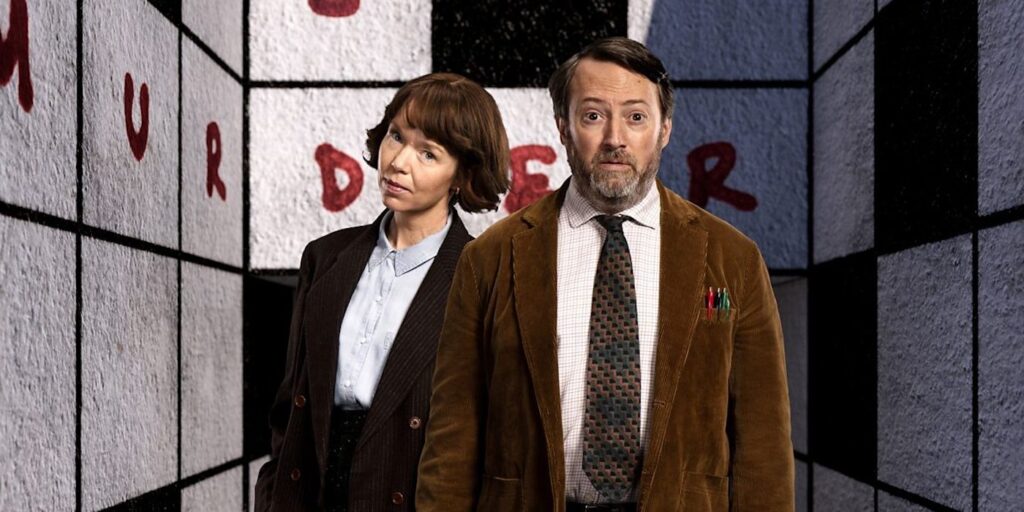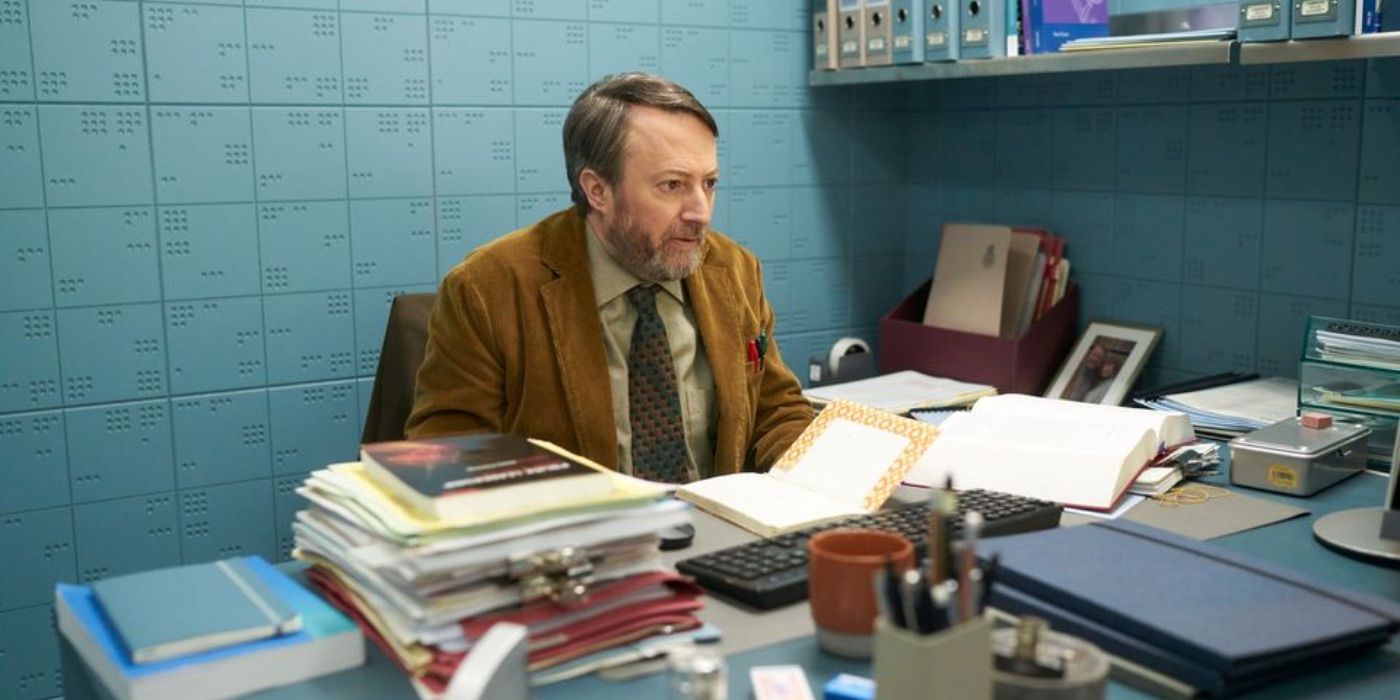This Puzzle-Inspired Detective Series is a Must-Watch for Agatha Christie Fans

Every year, fans of the queen of crime eagerly anticipate the seemingly annual Agatha Christie adaptation. However, Ludwig, a quintessentially British show, has just landed on BritBox and perfectly captures the eccentricity of Christie’s style. The series casts an unlikely hero in the role of detective, allowing it to fit perfectly into the subgenre of ordinary people solving crimes. Yet, it is the way it balances intriguing and seemingly impossible set-ups with satisfying explanations that fit into the devious nature of cozy crime.
Each episode follows the case of the week format, with a new cast of suspects and a new dead body. However, the show is held together by a broader mystery that gives the main cast purpose during their downtime. It allows it never to feel trivial and perfectly captures the warmth of amateur sleuth mysteries that have risen in popularity.
What is ‘Ludwig’ About?
Ludwig centers around John (David Mitchell), a reclusive man who writes puzzles for a living, using the show’s title as his pseudonym. This means that when he’s thrown into unlikely situations, his identity as Ludwig remains unknown to the strangers he meets, which allows John to be underestimated. He is lured to Cambridge by his sister-in-law, Lucy (Anna Maxwell Martin), after his brother has disappeared. Against his wishes, John is convinced to moonlight as his identical twin James, who works as a police officer. Initially planning just to gain intel through James’ computer, John cannot help but get involved with the cryptic nature of detective work.
The way John’s brain works allows Ludwig to present each case as a puzzle and use logic to solve it in a hugely satisfying way. It mirrors the way Agatha Christie was known for huge twists that brought in small aspects of the story that the reader had often missed. James’ disappearance serves as Ludwig’s main mystery, and John realizes his brother will have left clues surrounding his absence for him to decode. However, unlike other crime shows that spend all their runtime on the singular mystery, Ludwig utilizes the weekly case format, and this is where it becomes essential viewing for Christie fans.
‘Ludwig’ Uses Real-Life Puzzles
With Cambridge as a backdrop, each episode of Ludwig pulls John and his new colleagues to a new location. It utilizes the city’s classic architecture and sites, particularly surrounding the University, to craft individual and intriguing cases and evoke the cozy mystery style. Upon arrival at each crime scene, the show introduces a new mix of suspects, ranging from laborers on a building site to tourists on a walking tour around the city. The distinctive nature of each incident gives the show real variety and uniqueness. As a viewer, you scrutinize every individual’s story, asking where the holes in the narrative are to attempt to solve the case. However, if you are foxed, you have a new case in the next episode. It brings back an episodic formula that isn’t nearly as common as it once was.
Yet, it is John’s ability to turn every case into a puzzle that makes the show so compelling. Ludwig employs classic puzzle structures, such as locked-room mysteries and syllogisms, to encourage active participation from the audience and introduce a new structure to the oversaturated crime subgenre. Often, mystery shows are guilty of featuring conclusions that rely on a character or piece of information that was withheld until the final moments of an episode or series. Ludwig is transparent in the way it lays out all the moving pieces at the beginning of each episode through John’s explanations as he puts forward all the facts to allow his brain to process the information, which in turn allows the audience to do the same. This also means every solution feels earned and plausible, rather than put in place merely for dramatic effect.
‘Ludwig’ Blends Police Drama with Cozy Mystery
At the heart of Ludwig is its compelling cast, glued together by Mitchell, who plays a fairly standard role for those familiar with his work, building on his clear comedic timing from Peep Show. His chemistry with Anna Maxwell-Martin opens up a narrative around a found family, with the two both sharing a connection with James and learning to open up to each other about grief and trauma. There is poignant dialogue surrounding John’s feelings about his father leaving home at a young age and struggling to speak about it because James’ disappearance has opened up the memory. Similarly, there is a sense of acceptance among the workforce at the police station as John feels more comfortable with his position. However, throughout there is this lingering tension that someone will find his real identity, which means the show never feels too relaxed or low-stakes.
Ludwig is structurally unique, as it has elements of police procedural through its setting at James’ workplace. Yet it doesn’t heavily rely on acronyms and industry jargon, which makes it feel accessible rather than having the audience on the outside looking in. Therefore, it blends this industrialized setting with the amateur sleuth narrative, making the show feel authoritative yet cozy.
‘Ludwig’ Feels Straight Out of the Mind Agatha Christie
John, as a protagonist, feels hugely similar to some of Agatha Christie’s most recognisable detectives, in particular Poirot. In particular, the way he seems to view individuals as mere puzzle pieces and seems offended by others’ ignorance. He has a low tolerance for inefficiency, and others struggle to keep up with the speed at which his brain works. Similarly, John is not happy to settle for the easy explanation, and at numerous points in the show, he keeps digging into cases that others seemed to close. His investigative nature mirrors the way Christie’s detectives will never settle with the easy answer and often has to steer the narrative despite other characters believing the truth has appeared.
Christie has this particular skill in making characters multifaceted, so they never appear as truly evil but merely capable of murder due to the circumstances. In the reveal that someone has committed a crime, it never undoes what the audience learned about them throughout the narrative, rather, it serves to explain their actions. Ludwig takes a similar stance, the eventual culprits are not vicious serial killers in the same way the murders are excessively gory. Instead, the reveal serves to place all the puzzle pieces together in a logical and ordered manner. It doesn’t hinge on shock value, but that doesn’t stop the conclusion from being surprising among their coherence. The show captures the spirit of Christie, combining her light-hearted energy with her complex genius. It truly stands out as one of the most original detective shows of the decade.
Ludwig is now available to stream on Britbox.







